Top 5 Best & Worst Video Game Threequels - Page 2
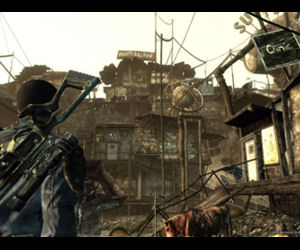 |
THE BEST
3. Fallout 3
|
THE BEST
3. Fallout 3
|  |
The spiritual successor to Wasteland (which is bar-none the most influential game you've never heard of), the Fallout series chronicles life in an alternate history, a post-nuclear apocalypse that is dominated by 1950's retrofuturism and cold war paranoia. The first two games, released in quick succession in the late nineties, are
RPGs notable for having multiple solutions to every problem and a wide range of endings depending on the actions of the player. The games have a deep universe and a quirky, dark sense of humor. Shortly after their release, they became cult classics. There were several aborted attempts to make a third Fallout, but it wasn't until the rights were purchased by Bethesda that the game would eventually find legs. I remember hearing about Fallout 3 when it was in development and being highly skeptical that it would work. At the time, I thought Fallout was a unique landmark, a piece of gaming magic that could never be recreated, and from what glimpses we were given of Bethesda's take on it, Fallout 3 looked too much like The Elder Scrolls IV: Oblivion. Don't get me wrong; Oblivion is a great game (severe understatement), but I didn't want to see Fallout resurrected as some bastardized game that didn't honor its predecessors. Of course, you don't need me to tell you how my apprehensions were smashed. Fallout 3 is an astonishing accomplishment that manages to bring everything that made the first two games great into the modern gaming generation. It has created a fanbase that is several times as large as the fanbase of the original two games, and it has breathed life into a seemingly dead franchise that is now poised to continue for the foreseeable future. If that's not an example of what a third installment should do, I don't know what is.
THE WORST
2. Animal Crossing: City Folk
| 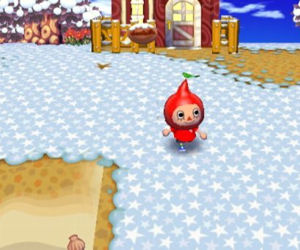 |
THE WORST
2. Animal Crossing: City Folk
|  |
The history of the Nintendo Wii is perhaps the most paradoxical success story in all of gaming. The console obliterated records, flew off store shelves, and increased the popularity of video games by at least 100%, and yet, if you talk to gamers today about the Wii, they will roll their eyes. It has become a black sheep among serious gamers, one that only the bravest will defend and only the most embarrassed will admit to still playing. How did this happen? Without going over the finer details and broad opinions on the matter, I will say that there was a definite turning point, a time when Nintendo still had the attention of the hardcore and could have kept them in the fold. This critical juncture, Nintendo's big opportunity to show serious gamers how they would be treated for the rest of the Wii's lifespan, was the moment they released Animal Crossing: City Folk. Fans weren't exactly lining up for another Animal Crossing, but the first two games in the series were surprisingly successful. Animal Crossing looks like the most saccharine-sweet kiddy game imaginable, but the gameplay is virtual crack, specifically designed to keep you playing until your eyes dry up, your fingers are unable to push buttons, and your brain has turned to jelly. In short, it is a pretty good game, and its sequel is a decent follow-up. Animal Crossing: City Folk, on the other hand, is an unmitigated failure on multiple levels, and it proves that Nintendo was not serious about keeping hardcore gamers around. For one thing, it is barely an improvement over its predecessors, which makes it feel like the designers just phoned in a glorified port. For another thing, if there is a single Nintendo franchise designed for online support, it's Animal Crossing, and yet, with Animal Crossing: City Folk, all Nintendo did to improve the online experience was to tack on an overpriced peripheral that does exactly the same thing that a speaker phone can do. Thirdly, it demonstrates that Nintendo's priorities at the time weren't on creating anything new or exciting for adults, but rather retreading old ground with a new emphasis on kid-friendly flair. Animal Crossing: City Folk isn't the only reason fans turned away from the Wii, but it is certainly one of the best examples. Here's hoping Nintendo's next console can do what they say it can and bring those serious gamers back home.
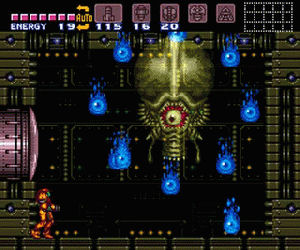 |
THE BEST
2. Metroid 3: Super Metroid
|
THE BEST
2. Metroid 3: Super Metroid
|  |
Speaking of Nintendo, they seem to have a hard time knowing what to do with the Metroid franchise, which is one of their oldest and most popular brands. It started its life as Nintendo's sole foray on the NES into action and sci-fi, and its protagonist, Samus Aran, has never quite fit in with the likes of Mario, Link, and Kirby. Metroid is the only Nintendo franchise with a single, cohesive storyline, a deep mythology, and an unwillingness to start from scratch with each new installment. It is also the darkest of Nintendo's offspring, and there is no greater demonstration of its unique tone than the opening credits of Metroid 3: Super Metroid, arguably the best Metroid game of them all. Super Metroid is the first to prove that a game can tell a riveting story without dialogue and that setting the mood is as important as designing the gameplay. It is also the first game to feel like a giant leap forward without changing things too radically, because on the surface, it is just like the original Metroid, only moreso. Though I am personally a big fan of the Metroid Prime games (and a determined supporter of Metroid: Other M), I can admit that Super Metroid may have set the bar too high, because nobody seems to know how to move the franchise forward while keeping the fans happy. For some very vocal fans out there, nothing will ever be superior to Super Metroid, but that's okay, because it is still a blast to play and still has the ability to surprise and amaze.
THE WORST
1. Star Fox Adventures
| 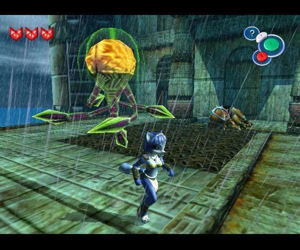 |
THE WORST
1. Star Fox Adventures
|  |
Question: what do you get when you take a wildly successful flight simulator, take out the bits where you fly around, add some dinosaurs, and tack on clumsy platforming? Answer: Star Fox Adventures, Nintendo's attempt to prove that it can ruin a franchise as badly as Sega ruined Sonic the Hedgehog. Nobody thinks that the characters are what make Star Fox and Star Fox 64 so great, and yet that's pretty much the only thing Star Fox Adventures has in common with those games. The travesty originates with Dinosaur Planet, a game that was being developed over at Rare at the end of the Nintendo 64's lifespan, back when Rare and Nintendo were still buddies. Dinosaur Planet has nothing to do with Star Fox, but when it became clear that Nintendo needed a solid launch title for the Gamecube and that the main character of Dinosaur Planet looked a little bit like Fox McCloud, Nintendo demanded that Rare tweak the game to turn it into a Star Fox title. Nobody has gone on record saying that Rare had a problem with this decision, but it should be noted that Star Fox Adventures was the last game Rare made for Nintendo (until very recently). Had it remained Dinosaur Planet, the game would probably be better remembered than it is, though it lacks anything substantial to set it apart from other platformers of its day. As it stands, though, it marks a severe turning point in the history of Star Fox, when Nintendo's blossoming new franchise crashed and burned so terribly that it is only now starting to tentatively stagger back to its feet.
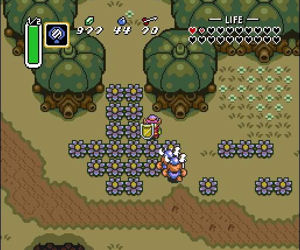 |
THE BEST
1. The Legend of Zelda: A Link to the Past
|
THE BEST
1. The Legend of Zelda: A Link to the Past
|  |
One could easily argue that every core Zelda title in the last twenty years has been, in one way or another, a remake of The Legend of Zelda: A Link to the Past. Though the first two games in the series are groundbreaking and influential (my previously stated opinions of Zelda II notwithstanding), they stand pretty much alone, having only superficial commonalities with the games that follow. Ocarina of Time might be the best entry in the franchise, but there's no denying that A Link to the Past is the most important, because it is the one that solidifies many of the elements that are now considered absolutely essential for a Zelda game. Nearly every innovation in the game is found in every title after it, including the concept of a mirror world, which is mimicked afterwards by all but Windwaker, and the deep storyline that evolves in-game. It doesn't try to reinvent the wheel--if anything, it's trying to merge the most successful aspects of the previous games--but it nonetheless does, creating a magic that Nintendo has been chasing ever since.
-e. magill 8/16/2011
|
|